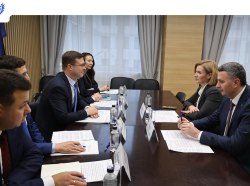Tiraspol, 19 November. / Novosti Pridnestrovya /. Yesterday the president held a meeting with Tiraspol residents. During the dialogue socio-economic issues related to pensioners and public sector employees as well as forecasts for the first quarter of 2016 were brought up.
The president noted that forecasting economic development trends is almost impossible even in the short term under unstable and uncertain economic circumstances in the region.
In particular, Yevgeny Shevchuk focused on the potential impact of external adverse factors.
«Ukraine and Moldova have agreed and now are nearly about to establish new customs checkpoints in the Ukrainian territory. It is still unclear what restrictions it will bring about and how it will influence commodity flows. Although we are requesting for information, consulting and negotiating over this issue," said the president.
Besides, the head of state highlighted the fact that trade preferences granted by the EU to Pridnestrovie's enterprises are expected to expire on 1 January 2016.
«There are very peculiar requirements. In case we join an association agreement, we will have to admit Moldovan tax and customs experts to our territory and, in fact, become subject to the Moldovan legislation," clarified Yevgeny Shevchuk.
However, the president said, economic risks Pridnestrovie may face after the implementation of a new trade regime will not result in denying its independence, and the government will be seeking to counter possible destructive factors.
«We realise there are risks to incur certain losses, but we are not going to trade our sovereignty after all!» underscored the president.
Speaking about the current socio-economic situation, the president also drew attention to the rising difference between budget revenues and expenditures He cited the data for the past 10 months: «We received 2.5 billion roubles in tax revenues, but paid pensions and salaries at an amount of 3.1 billion roubles. We accumulated about 600 million roubles for the provision of pensions, but had to pay 1.1 billion roubles. With such a difference, we are looking for sources to clear off budget deficits. We used to collect revenues from the privatisation of enterprises. We do not have this source of revenues any longer. We haven't sold any enterprise since 2012," said the president.
As compared to 2014, Yevgeny Shevchuk noted, enterprises reduced tax payments by nearly 400 million roubles ($400 million) in the past 10 months of 2015. «Besides, last year Ukraine reviewed the procedure for carrying out foreign economic activities with Pridnestrovie's economic agents and, in fact, closed its border to excisable goods. We lost more $20 million in net revenues," said Yevgeny Shevchuk.
Yevgeny Shevchuk also mentioned that not once had the president and the government submitted to the Supreme Council a number of draft laws aimed at collecting additional revenues, including an offshore duties act and a tax code, which is required to reconsider and redistribute profits. However, these bills were rejected. In order to receive additional funds for securing social payments, the president decided to introduce an offshore duty with a decree. Besides, external borrowings were made, the presidential press office reports.
Yevgeny Shevchuk noted that in the crisis many CIS countries mobilized internal reserves, which Pridnestrovie lacks, and «took the path of controlling currency exchange rate, taking into account current market conditions.» «We also considered the alternative of paying salaries and pensions in full by depreciating the national currency. But we made the unpopular decision: reduced expenditures and maintained the rate of the national currency. This decision has proved correct," underscored the president. Otherwise, he clarified, we would face hyperinflation, price chaos, and now the government does not have any efficient legal tools to control pricing.








